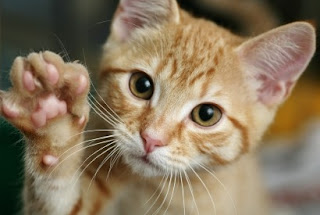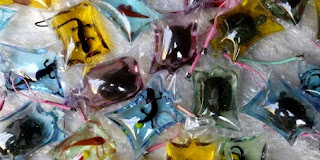What You Need to Know About Declawing Your Cat
Declawing your cat traditionally involves the amputation of the last bone of each toe of the cat, which is equivalent to cutting off a person’s first knuckle. Imagine how painful that must feel. This surgery is not only unnecessary but also a painful and permanently crippling procedure that does not benefit the cat at all.
In recent years, the process of declawing has become more popular as many cat owners believe that the procedure of declawing a cat is a simple and harmless way of getting rid of your cat’s scratching habit that may damage furniture and carpets in homes.
But that is incorrect. Declawing a cat can lead to many serious long-term effects to your cat, which is why this cruel process is banned in 22 countries including Australia, England, and New Zealand.
Why you should not declaw your cat
What most people may not know, is that scratching is actually a normal behaviour for the cat, it is not intended to destroy your curtains or your couch, but in fact cats need to scratch in order to maintain good physical and emotional health.
Cats scratch in order to stretch their muscles and tendons in their toes, paws, legs, and shoulders, which they often do when they first wake up from a nap, or in the middle of playing when they are happy, and to release energy during times of stress.
Cats also scratch to remove the dead husks from their claws and to mark territory. Scratching leaves a virtual sign to other cats that a specific location belongs to another feline.
Not only does a cat uses its claws for scratching, but it is also their first line of defence. They use their claws to scratch when fighting with other cats or animals and to protect themselves. They also extend their claws as a warning. Without claws, they are far more vulnerable to predators and abusers.
These cats also become more aggressive as they feel so insecure without their claws. More often than not they will resort to their second line of defence which is biting as a means of self-protection.
A cat who has been declawed will also most likely refuse to relieve itself in a litterbox, even if they are house-trained. This is because the cat has wounds on its feet after being declawed. Dr. Ryane E. Englar, assistant professor and clinical education coordinator at Kansas State University in Manhattan, Kansas, states that “When cats use the litter box, they tend to dig, or at least cover up their leavings. If cat litter gets in those wounds, it hurts. So a cat may avoid going in the litter box, thinking their feet may hurt less if they go somewhere else.” The cat is highly likely to associate pain with the litter box so they might avoid it all together.
Risks of declawing your cat
Because declawing your cat is a surgical procedure, there is a high chance of your cat getting an infection after the surgery.
Declawed cats will also have to re-learn how to walk. Our toes are crucial to our balance, well it is the same for cats. Declawing is the same as cutting off their toes. Domestic cats are digitigrade, which means they walk on their toes.
So when you declaw your cat, pain in the toes will alter the way they walk, this can be temporary or permanent following the declawing. This may affect the joints in its legs, resulting in stiffness and pain in not only their legs but they hips and spine as well and may lead to your cat developing arthritis.
Back pain in cats after being declawed can be caused by lameness, or abnormal gait. It happens more commonly to heavier cats as they are not carrying their weight as they should due to their painful feet, just like how we might walk differently if we have a blister on our foot.
Declawing your cat is a very painful procedure and the pain continues even after the surgery. Pain medicine may help, but only a little. Phantom pain, which is pain that feels like it's coming from a body part that's no longer there, can last for weeks or even months.
This excruciating pain your cat has to suffer can simply be avoided if you take look into alternatives to prevent your cat from ruining your furniture. Such as doing a nail trimming. Cats are unable to do serious damage to furniture with blunt nails. Or you can get a scratching post for your cat. Most cats can be easily trained to use a scratching post instead of scratching on your furniture.



Great read; thanks for the ideas about alternatives!
ReplyDeleteYes to this goodness! Declawing your cat is cruel and unnecessary. There are so many ways to prevent your cat from scratching furniture without causing them pain. And if you aren't willing to explore alternative, cruelty free options then you shouldn't adopt a cat. Thank you for sharing such an important message!
ReplyDeleteSara | mshealthesteem.com
Wow...I didn't even know declawing existed and is forbidden in some places! Thanks for sharing and educating me.
ReplyDeleteAlways been so terrified of cats until i met Benjamin who is the sweetest cat and oh my never even knew about all this! Loved this post
ReplyDeleteHear is a valid idea for everyone that thinks declawing your cat is a viable action. Get a stuffed toy cat, it won't scratch, bite, pee on the couch and lie decoratively where you want it at all times. The same goes for people who feed their carnivorous pets a vegan diet. If you're not prepared to accept your pet the way it is, don't get one. We've had multiple cats all my life and none has ever scratched any furniture besides an old whicker chair, which can take it. They were also allowed to be outside whenever they wanted to. If you can't offer your cat the opportunity to roam outside safely, don't get one. I have seen plenty of cats that developed really aggressive streaks due to being locked in an apartment all day.
ReplyDeleteThank you for commenting and I really agree with it! I have been trying to tell people countless times that cats are not the same as dogs, they should not be fed a vegan diet. There are reputable vets who stand by this statement] but some people just won't listen to reason and it can be so infuriating and frustrating at times.
DeleteExcellent, informative post. Many people still do not realize the repercussions of declawing or the alternatives. Growing up, my family owned cats and they all lived long, happy lives climbing trees in the backyard. Though all of them were adopted as strays, none of them were ever aggressive or destroyed our furniture. Also, animals are our companions, not our toys or playthings. If you aren't prepared for the responsibilities of owning a pet, you really should not get one.
ReplyDeleteVery informative indeed! Thanks for the detailed article. Keep up the good work :)
ReplyDeleteThis was interesting to read even for a person who doesn't have a cat. To be honest I did not know people did such procedures to their cats. I am sure it is annoying when cats scratch but you can get them a scratch thing for it, can't you.
ReplyDeleteIt is a Very informative and helpful article . Thanks for the article. Really you are doing great job .
ReplyDeleteDeclawing is inhumane and cruel. I know people who use those plastic claw things to go over the claws. We have a cat, and we bought her a scratching post. She uses it and doesn't bother furniture now.
ReplyDeleteWe're a dog family, so I don't know too much about cats, but you've provided a lot of great info I didn't know about declawing cats.
ReplyDeleteI really had no idea how cruel and inhumane it was to declaw a cat. I’m allergic to cats , so unfortunately I’ll never have one. I hope this practice stops!!
ReplyDeleteReading this broke my heart :( I can't believe that humans can be so selfish! Thank you for such an informative post! xx
ReplyDeleteI knew I just couldn't bring myself to declaw my Eva! I am glad I did not because she has gotten out and has probably needed them to defend herself! Thank you for sharing this with everyone and hopefully this will stop happening!
ReplyDeleteI had always heard how horrible it was to declaw a cat and now I can totally see why! I am siting here looking at my 2 cats and wondering how anyone could do that to a cat :(
ReplyDeleteThis is great information for anyone that has a cat. I love the alternatives you mentioned!
ReplyDeletethis is an awesome read with those with kitties!
ReplyDeleteGreat post - super informative. We used to have a cat but never even knew people did this to their cats??
ReplyDeleteTammie | Photography & Fashion Blog
http://whatoftheday.com
@tamarasputri
Thank you for your comment. But I would appreciate it if you did not leave a link down to your website. Thank you.
DeleteIt is so important to spread this message! I don't have cat, just dog, but it's good to know about it either way
ReplyDeleteVery informative article...thank you
ReplyDeleteI always thought declawing was awful! This definitely confirmed it. I don't see the issue with leaving the claws on. I just make sure to keep them trimmed on my cat.
ReplyDeleteWow. I knew this was common but had no idea that it was so awful. Thank you for this info!
ReplyDeleteI can't believe how many people get their poor kitties declawed because they don't know how bad it is. NONE of mine have been declawed and I tell everyone I know to never do it!
ReplyDeleteThis is aweful to do to a cat. The purpose for the claws is for them to be able to defend themselves. I like the alternatives you mentioned. People should really be mindful of the things they do to animals. Great post!
ReplyDeleteInformative for everyone who has cats . Thanks for sharing
ReplyDeleteNever thought it was possible to declaw a cat! Sounds weird to me too, those poor animals! Such a good post, thank you for sharing! Xx
ReplyDeletewell-written and very informative,thanks for sharing
ReplyDeleteI've never had a cat, and also never heard of cats being declawed. Your post is very informative. A cruel and unnecessary practice!
ReplyDeleteAnd probably the cat is very scared as all this is going on!
ReplyDeleteI agree! We should not declaw our cats! Just imagine removing your nails! That is awful!
ReplyDelete